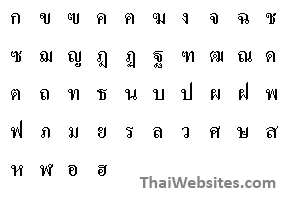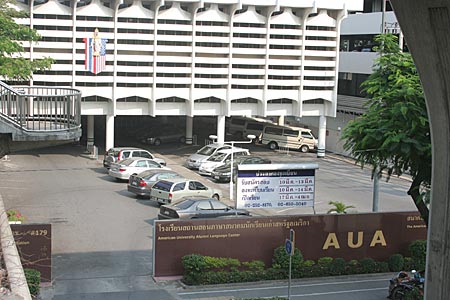Studying Thai Language
The Thai language is classified by linguists as belonging to a Chinese-Thai branch of the Sino-Tibetan family. Besides standard Thai (based on the central dialect), taught at school, used in radio and TV broadcasts etc, there are regional dialects in the northern, northeastern, and southern regions.
The Thai spoken language is tonal (like Chinese and Vietnamese), and mostly monosyllabic. However, besides a simple, monosyllabic component there are also many 'imported' words with Sanskrit and Pali origin, which are not monosyllabic and rather complicated.
The writing was based on Pali, Sanskrit, and Indian concepts, and many Mon and Khmer words entered the language. King Ramkhamhaeng of the Sukhothai area, introduced the written Thai language, and inscriptions in Thai language date from the Sukthothai area (started 1283 A.D.)
 Thai consonants
Thai consonants
The Thai alphabet uses forty-four consonants and fifteen basic vowel characters. The script is horizontally placed, left to right, with no intervening space, to form syllables, words, and sentences. Vowels are written above, below, before, or after the consonant they modify. So there are a few different Thai consonants used to indicate the sound of the English consonants 's' or 't'. These differences are both historical (related to the origin of the language) and functional (used to indicate the tone of the syllable). Thai language does not use capitals.
There is hardly any grammar in Thai language. No plurals, past tense, future tense. This is quite astounding in view of the fact that most Western languages use very elaborate grammar. However, in practical terms it is quite easy to indicate past tense, future tense by addition of extra words. For example, if you include yesterday in a sentence, you actually know you are talking about the past. Articles such as 'the', 'a', 'an' are also not used.
Difficulties in studying the Thai Language :
Having little grammar sounds good if you want to learn the language. The Thai alphabet of course looks difficult when you first encounter it, but in practice it is not difficult to learn. Also the fact that the words in a sentence are all linked together, so you do not really recognize immediately where a word ends, and the next word begins, is not a real difficulty and can easily be managed.
The main difficulty is that the Thai language is tonal. There are 5 tones : the mid tone, high tone, low tone, rising tone and falling tone. The meaning of words varies widely depending on which tone is used. If you pronounce tones the wrong way, you will usually not be understood, except by Thai language teachers, who are trained and used to this problem. Learning to use and be able to differentiate tones when listening, is highly individually dependent. That is, some persons never quite manage to do it, some persons don't see the difficulty (the minority). To learn this important component of the language, is a slow process and most students will need to be patient. You certainly will not be able to learn to speak Thai by just looking at a textbook, at least you need audio accessories, and best is to interact with a teacher to see of you are being understood.
A second important difficulty is that it is difficult to differentiate between certain consonants. For example, the Thai language has consonants for the sounds (in English) 't', 'th','p','ph','k'.'kh'. In English language it is hardly necessary to differentiate between these consonants, to be understood. However, in Thai, the words will have quite different meaning dependent on whether you use 't' or 'th'. This is the second most important difficulty, and you will need a good teacher to point out to you whether you pronounce words the right way.
Reading the Thai language can be learned. Granted, it will take some time to become proficient, but it can be done. Writing is more difficult, because there are a lot of irregularities in the written language, and you will have to memorize a lot of words, if you do not want to make lots of mistakes. Practically speaking, it is very useful to be able to read. You will be able to read road signs, shop names etc. while travelling. At a higher level, you can read Thai non-fiction books with some effort, use Thai language teaching materials etc. and save a lot of money that way, if you need the information (books in Thai language are rather cheap, even when nicely printed and illustrated, and costs a fraction of books in English language). In daily life, you will have little use in being able to write Thai correctly, unless you need to pass a Thai language exam of course, when it will be quite necessary.
In summary everyone with average intelligence will be able to understand, read and write Thai language. More and more foreigners are able to speak Thai, but you must somehow be gifted to do this very well. The effort will always be appreciated, but many foreigners do not manage well to make themselves understood, due to the difficulties indicated above.
Thai Language Schools
We have experience with studying at AUA (American University Alumni). For years, this school for studying English language, and its associated section for studying Thai language was located on Rajadamri Road. The Thai language school moved away to Chamchuri Square Office Tower on Rama IV Rd. from 2012, for a few years. However, it is now back at its old location. It can best be reached from Rajadamri skytrain station. Alternatively, you can walk to and from Chitlom skytrain station, if you are living around Sukhumvit area, and do not want to hassle with a stopover at Siam Square.
This language school uses an ALG (automatic language growth) program to teach Thai language. It can also be called the 'natural approach'. Studying is based on listening, and trying to understand what the teacher is saying. Most classes have teachers interacting and talking about different subjects, while the students just listen. It is actually not allowed for the students to speak any Thai during the first few months of learning. You need to have a lot of time at hand, to enroll into this program. Basis price is now (2021) about 150 baht per hour, with discounts if you purchase more hours in advance, or when you reach higher levels.
 AUA is again located close to the skytrain station on Rajadamri Road, after a few years at Chamburi Square Office Tower.
AUA is again located close to the skytrain station on Rajadamri Road, after a few years at Chamburi Square Office Tower.
This program does not work for everyone, generally speaking the older you get, the more difficult it will be for you to pick up the language well, and be able to speak properly later. This might be the best system though, if you want to understand and listen to Thai language. Besides the language skills you may or may not pick up, you will learn a lot about Thai society and culture, more than you ever will learn from reading books. We can recommend you try out this program and see how it works. People tend to know after a month or two, whether the program makes them progress or not. If you do not see great benefit, you may want to move on to other schools, although by that time, you may have settled in, made some friends, and like the pleasant interpersonal environment there.
Website : www.auathai.com
If you do not succeed at AUA, you can check out Union Language School. It is often recommended as offering good value. Courses are intensive, and allow for language interaction between students and teachers. Then again, there are tens of schools teaching Thai language around Bangkok, and there are lots of available private tutors.
Union Language School
328 CCT Office Building, 7th floor
Ratchathewi, Phayathai
Bangkok, Thailand
Tel: 0-22146033
Email: [email protected] - www.UnionLanguageSchool.com

